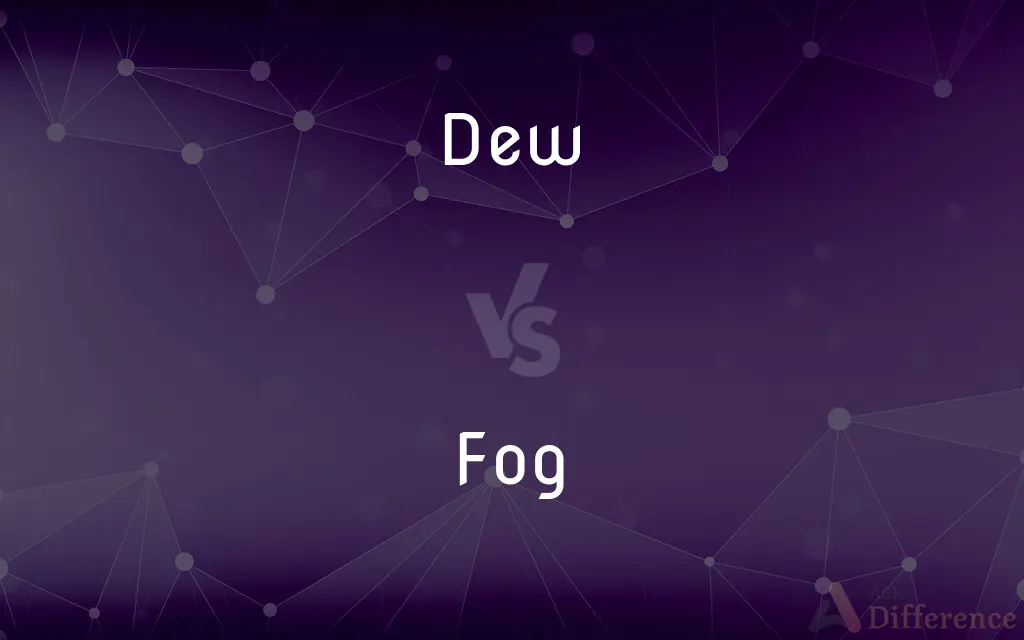Dew vs. Fog — What's the Difference?
By Tayyaba Rehman — Updated on October 12, 2023
Dew is moisture condensed onto surfaces, especially in the morning or evening, while Fog is a cloud of tiny water droplets suspended in the atmosphere near the ground.

Difference Between Dew and Fog
Table of Contents
ADVERTISEMENT
Key Differences
Dew and Fog are both related to moisture, but they manifest differently in the environment. Dew is the result of moisture condensing on cool surfaces, especially during the early morning or late evening. You might observe dew as tiny droplets on grass or on the exterior of your car. On the other hand, fog is essentially a cloud that forms close to the ground. It's a collection of tiny water droplets suspended in the atmosphere that reduces visibility.
The formation of Dew typically occurs on clear nights when the surface cools down by radiating its heat to the atmosphere. As the surface temperature drops, the moisture in the air condenses on it, resulting in dew. Conversely, Fog forms when the air's temperature and dew point are close together, causing the moisture in the air to condense and create a cloud near the ground level.
Both Dew and Fog have fascinated poets and writers for centuries. Dew is often associated with freshness, purity, and the start of a new day. It's seen as a symbol of rejuvenation. Fog, however, can evoke mystery, obscurity, or even confusion due to its nature of obscuring the vision.
In terms of impact, Dew is relatively benign. It can offer moisture to plants and even provide a source of water in certain survival situations. Fog, on the other hand, can be hazardous, especially for transportation. Reduced visibility on roads and waterways can lead to accidents.
To sum up, while Dew and Fog both relate to the presence of moisture in the environment, they differ in their formation, appearance, and impact. Dew forms on surfaces due to cooling, and fog is a cloud of moisture droplets that forms near the ground.
ADVERTISEMENT
Comparison Chart
Definition
Moisture condensed onto surfaces
Cloud of tiny water droplets suspended near the ground
Formation
Condensation on cool surfaces
Air temperature and dew point being close together
Visibility Impact
None
Reduces visibility
Associated Imagery
Freshness, purity
Mystery, obscurity
Potential Hazard
Minimal
Can be hazardous for transportation
Compare with Definitions
Dew
Tiny droplets of water that form on cool surfaces.
The morning dew glistened on the grass.
Fog
A weather condition that reduces visibility.
The fog made driving conditions dangerous.
Dew
Moisture that appears in the morning or evening.
The car was covered with dew when he started his journey.
Fog
A misty or hazy appearance.
The mountains were obscured by a thick fog.
Dew
Liquid condensation from the atmosphere.
The dew on the spider web looked like pearls.
Fog
A state of confusion or lack of clarity.
He had a fog of thoughts and couldn't concentrate.
Dew
Result of atmospheric moisture condensing at night.
The flowers were refreshed by the night's dew.
Fog
Fog is a visible aerosol consisting of tiny water droplets or ice crystals suspended in the air at or near the Earth's surface. Fog can be considered a type of low-lying cloud usually resembling stratus, and is heavily influenced by nearby bodies of water, topography, and wind conditions.
Dew
Dew is water in the form of droplets that appears on thin, exposed objects in the morning or evening due to condensation. As the exposed surface cools by radiating its heat, atmospheric moisture condenses at a rate greater than that at which it can evaporate, resulting in the formation of water droplets.When temperatures are low enough, dew takes the form of ice; this form is called frost.
Fog
A thick cloud of tiny water droplets suspended in the atmosphere at or near the earth's surface which obscures or restricts visibility (to a greater extent than mist; strictly, reducing visibility to below 1 km)
The collision occurred in thick fog
Dew
Water droplets condensed from the air, usually at night, onto cool surfaces.
Fog
A state or cause of perplexity or confusion
The coffee helped clear the fog in my brain
Dew
Something moist, fresh, pure, or renewing
"The timely dew of sleep / ... inclines / Our eye-lids" (John Milton).
Fog
The grass which grows in a field after a crop of hay has been taken.
Dew
Moisture, as in the form of tears or perspiration, that appears in small drops.
Fog
(with reference to a glass surface) cover or become covered with steam
The windscreen was starting to fog up
Hot steam drifted about her, fogging up the window
Dew
To wet with or as if with dew.
Fog
Bewilder or puzzle
She stared at him, confusion fogging her brain
Dew
(uncountable) Any moisture from the atmosphere condensed by cool bodies upon their surfaces.
Fog
Spray with an insecticide.
Dew
(uncountable) Moisture in the air that settles on plants, etc in the morning or evening, resulting in drops.
Fog
Condensed water vapor in cloudlike masses lying close to the ground and limiting visibility.
Dew
An instance of such moisture settling on plants, etc.
There was a heavy dew this morning.
Fog
An obscuring haze, as of atmospheric dust or smoke.
Dew
(figurative) Anything that falls lightly and in a refreshing manner.
Fog
A mist or film clouding a surface, as of a window, lens, or mirror.
Dew
(figurative) An emblem of morning, or fresh vigour.
Fog
A cloud of vaporized liquid, especially a chemical spray used in fighting fires.
Dew
To wet with, or as if with, dew; to moisten.
Fog
A state of mental vagueness or bewilderment.
Dew
Moisture from the atmosphere condensed by cool bodies upon their surfaces, particularly at night.
Her tears fell with the dews at even.
Fog
Something that obscures or conceals; a haze
Shrouded their actions in a fog of disinformation.
Dew
Figuratively, anything which falls lightly and in a refreshing manner.
Fog
A blur on a developed photographic image.
Dew
An emblem of morning, or fresh vigor.
Fog
A new growth of grass appearing on a field that has been mowed or grazed.
Dew
To wet with dew or as with dew; to bedew; to moisten; as with dew.
The grasses grewA little ranker since they dewed them so.
Fog
Tall, coarse grass left standing in fields through the winter.
Dew
Same as Due, or Duty.
Fog
To cover or envelop with fog.
Dew
Water that has condensed on a cool surface overnight from water vapor in the air;
In the morning the grass was wet with dew
Fog
To cause to be obscured; cloud.
Dew
A symbol of freshness or purity.
Her skin was as soft as morning dew.
Fog
To make vague, hazy, or confused
A memory that had been fogged by time.
Fog
To obscure or dim (a photographic image).
Fog
To be covered with fog.
Fog
To be blurred, clouded, or obscured
My glasses fogged in the warm air.
Fog
To be dimmed or obscured. Used of a photographic image.
Fog
(uncountable) A thick cloud that forms near the ground; the obscurity of such a cloud. mist, haze.}}
A bank of fog
Fog
(uncountable) A mist or film clouding a surface.
Fog
A state of mind characterized by lethargy and confusion.
He did so many drugs, he was still in a fog three months after going through detox.
Fog
(photography) A silver deposit or other blur on a negative or developed photographic image.
Fog
(computer graphics) Distance fog.
Fog
A new growth of grass appearing on a field that has been mowed or grazed.
Fog
Tall and decaying grass left standing after the cutting or grazing season.
Fog
(Scotland) Moss.
Fog
(intransitive) To become covered with or as if with fog.
Fog
(intransitive) To become obscured in condensation or water.
The mirror fogged every time he showered.
Fog
To become dim or obscure.
Fog
To make dim or obscure.
Fog
To spoil (film) via exposure to light other than in the normal process of taking a photograph.
Fog
(transitive) To cover with or as if with fog.
Fog
(transitive) To disperse insecticide into (a forest canopy) so as to collect organisms.
Fog
(transitive) To obscure in condensation or water.
Fog
(transitive) To make confusing or obscure.
Fog
To practice in a small or mean way; to pettifog.
Fog
(transitive) To pasture cattle on the fog (of), or aftergrass, of; to eat off the fog from (a field).
Fog
(intransitive) To become covered with the kind of grass called fog.
Fog
A second growth of grass; aftergrass.
Fog
Watery vapor condensed in the lower part of the atmosphere and disturbing its transparency. It differs from cloud only in being near the ground, and from mist in not approaching so nearly to fine rain. See Cloud.
Fog
A state of mental confusion.
Fog
Cloudiness or partial opacity of those parts of a developed film or a photograph which should be clear.
Fog
To pasture cattle on the fog, or aftergrass, of; to eat off the fog from.
Fog
To practice in a small or mean way; to pettifog.
Where wouldst thou fog to get a fee?
Fog
To envelop, as with fog; to befog; to overcast; to darken; to obscure.
Fog
To render semiopaque or cloudy, as a negative film, by exposure to stray light, too long an exposure to the developer, etc.
Fog
To show indistinctly or become indistinct, as the picture on a negative sometimes does in the process of development.
Fog
Droplets of water vapor suspended in the air near the ground
Fog
An atmosphere in which visibility is reduced because of a cloud of some substance
Fog
Confusion characterized by lack of clarity
Fog
Make less visible or unclear;
The stars are obscured by the clouds
Fog
A cloud of tiny water droplets near the ground.
The city was blanketed in fog this morning.
Fog
Moisture suspended in the air.
The fog lifted by mid-morning, revealing the sun.
Common Curiosities
How does Fog differ from Dew?
Fog is a cloud of tiny water droplets suspended near the ground, reducing visibility.
Can Dew be beneficial for plants?
Yes, Dew can provide plants with essential moisture.
Does Dew form in deserts?
Yes, even in dry areas, Dew can form during cooler nights.
Is Fog dangerous for driving?
Yes, Fog can reduce visibility and make driving hazardous.
Is Dew only seen in the mornings?
No, Dew can also form in the evenings or other times when surfaces cool.
Can Fog occur indoors?
Typically no, but in certain conditions like cold storage areas, a fog-like mist might appear.
How is Dew formed?
Dew forms when the surface cools and causes the moisture in the air to condense on it.
When is Fog most common?
Fog often occurs in the early morning or during times when the air temperature and dew point are close.
How does Fog dissipate?
Fog can dissipate with rising temperatures, wind, or the presence of the sun.
Do Dew and Fog have any cultural or symbolic meanings?
Yes, Dew often symbolizes freshness, while Fog can represent mystery or obscurity.
Can Dew be harvested for water?
In certain survival situations, Dew can be collected as a water source.
What is Dew?
Dew is moisture that condenses onto surfaces, especially during the early morning or late evening.
Can Dew and Fog be predicted?
Meteorologists use data and models to predict the likelihood of Dew and Fog formations.
How can I drive safely in Fog?
Reduce speed, use low beam headlights, and maintain a safe distance from other vehicles when driving in fog.
How thick can Fog get?
In dense fog conditions, visibility can reduce to less than a quarter of a mile.
Share Your Discovery

Previous Comparison
Skirt vs. Frock
Next Comparison
Amazing vs. ExtraordinaryAuthor Spotlight
Written by
Tayyaba RehmanTayyaba Rehman is a distinguished writer, currently serving as a primary contributor to askdifference.com. As a researcher in semantics and etymology, Tayyaba's passion for the complexity of languages and their distinctions has found a perfect home on the platform. Tayyaba delves into the intricacies of language, distinguishing between commonly confused words and phrases, thereby providing clarity for readers worldwide.














































